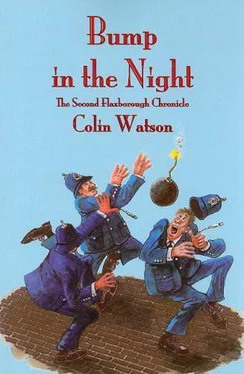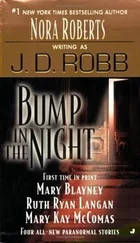Purbright watched Mrs Pointer but she showed no reaction. “Is that true, Mrs Pointer?” he asked her. “Was the adoption arranged because your husband knew he was not the child’s father?”
The woman tightened her mouth and seemed to be marshalling strength for another attempt at the unaccustomed exercise of speech.
“He had been to France, hadn’t he?” Purbright prompted. “Was that something to do with it?”
Mrs Pointer moved closer to Hilda and accepted the arm that she slipped, almost absent-mindedly, round her shoulder. “I’m sorry,” the mother said. They were the only words she had been able to summon. Her life, thought Purbright, must have become a single, dreary act of apology, He felt sadness, yet no compassion.
“Have you anything more to ask. Inspector?” Hilda had resumed her role of manager.
“Yes,” said Purbright, deliberately. “I should like to be told the name of Celia’s father.”
“I...I can’t tell you that.”
“Please believe me: this is not idle and impertinent curiosity. The matter is important and perhaps urgent.”
Mrs Pointer shook her head. The action was more like a shudder.
“He’s still alive?”
“Yes,” she whispered. “Oh, yes.”
“And living here in the town?”
She made no reply.
“Tell me, Mrs Pointer: had this man maintained a relationship with Celia over the years? Not necessarily as a father, I mean, but an affectionate relationship.”
“He used to see her, I believe.”
“They were fond of each other?”
“Oh, yes.” The words emerged dreamily, enviously.
“Won’t you tell me his name?”
The ghost of an old pride stirred in the faded frightened little woman. She looked directly into Purbright’s face. “Certainly not,” she said.
Purbright and Hilda left her there in the garden. She was kneeling beside some border plants, fussily easing them apart.
At the front door, Hilda Larch hesitated. “Why couldn’t they have told me? Now there’s so much...so much I can’t put right in my mind.”
Purbright said nothing. She passed a hand across her brow. “It’s too late.”
After a while she looked up at him. “That man who killed Celia...”
“Biggadyke.”
“Yes. He...I let him make love to me.” The muscles of her neck were tightly drawn.
“I see.”
She stroked the knob of the Yale lock with her palm “You think, don’t you...that Celia’s father...”
“Murdered...”
Her eyes blazed. “Executed, you mean!”
“That probably is a better word.”
She nodded. “I’m glad mother said no more. Goodbye, Inspector.”
On the step he turned. “There’s just one thing, Mrs Larch.”
She waited.
“That night when Biggadyke was killed—why did you decide to stay away from his caravan?”
A slow, careful smile passed over her face. “I had a telephone message, Inspector. From the Civil Defence people. They said my husband had finished early and was on his way home.”
“And was he?”
“There must have been some mistake. He arrived the following day—as usual.”
“The voice on the telephone...”
Her smile broadened. “Absolutely unidentifiable, Inspector, I assure you. But I liked it. I liked it tremendously.”
The door closed.
Purbright walked slowly down the path. He was searching his memory for something he knew had matched an impression just received. It was as though he had emerged from a market knowing that on two separate stalls were pictures or ornaments which, though unremarkable each in itself, once had formed a pair. He recalled Mrs Pointer’s pale, bewildered face; its expression of constant readiness to register regret for something. Had he seen it before? He thought not. Years of self-immolation had left it almost devoid of memorable peculiarities.
Hilda’s, then? Handsome, bitter, faintly mocking. He pictured Hilda Larch hiding intense shock and disgust beneath the simple mechanics of lighting a cigarette; she had managed it with the brusque carelessness of a horsewoman between gymkhana events. The sense of an unplaced resemblance grew stronger. It was something to do with Hilda, perhaps her whole features and bearing, or at least some look or mannerism of hers, that Purbright had seen in another person since his arrival in Chalmsbury.
He tried to conjure a mental identification parade, but it was no use. The faces blurred and merged, like images in wind-ruffled water. He crossed to the shaded side of the road and sauntered, with blank mind and painfully hot feet, back into the town.
Larch, in shirt sleeves, sat at his desk by an open window. He looked cool, but unrelaxed. Purbright gave him a somewhat dessicated account of his afternoon’s visiting.
“What a good job you’re a policeman, Mr Purbright. The husbands of bitches are terribly prone to be blackmailed. Did you know that?”
The pleasantry was ignored. Larch tried another. “Well, have you found poor Stanley’s bloody murderer?”.
“Certainly.”
“Go on, then, Mr Purbright.”
“He’s your mother-in-law’s lover.”
Larch stared, his face twisted as if he were trying to catch a scarcely audible sound. Then, suddenly, his jaw dropped like an excavator bucket and there emerged a guffaw that turned Sergeant Worple, sitting in the charge room fifty feet away, pale with alarm.
When the short spasm was over, Purbright demurely corrected himself. “Former lover, I should have said, of course.”
“Yes, by God you should!” A rumbling echo of amusement sounded in Larch’s gullet. “But it doesn’t take you much further does it? I’m afraid our filing system doesn’t run to records of the ex-boy friends of the town’s middle-aged ladies.”
“We might not need records. There are pretty long and retentive memories in a place like this.”
“Retentive in more than one sense. They don’t open up in the name of the law, believe me.”
Purbright looked at Larch thoughtfully. “Excuse my asking, but you’re a few years older than your wife, aren’t you?”
“What the hell’s that to do with it?”
“Only that it struck me that you might remember something yourself of what went on here twenty years ago. Gossip, you know. Were you around then?”
“I was, as it happens. But I hadn’t married into the bloody Pointers.”
“I didn’t mean family gossip—just parade room talk.”
Larch leaned back with a sigh. “Look, son: this was a real police force in the ’thirties. We didn’t sit around over tea and knitting. If you think...”
“Mr Larch,” Purbright interrupted firmly, “I don’t much mind your being aggressive, obtuse, bombastic and generally offensive. What I shall not tolerate, though, is the old copper gaff. Now, do we understand each other?”
There was a long silence. Then Larch gave a slight, dismissive wave of the hand and looked down as though calculating something rather difficult.
“No,” he said quietly at last, “I can’t recall a damn thing that might give you a lead. I knew the Pointers, of course. Not intimately; I hadn’t met Hilda then. And I remember something about Ozzy going over to France. That’s all.”
“How old would his wife have been?”
“Thirty, thirty-fivish.”
“Promiscuous?”
Larch seemed almost shocked. “Damn it, man. You’ve seen her. Even twenty years...”
“Perhaps not,” Purbright agreed. “We’ll give her credit for having been selective. It was probably a genuine first-and-last romance. And as discreet as a spinster buying a bottle of scent.” He paused. “Yet there was something...
“Tell me,” said Purbright, suddenly brisk, “you knew this Celia girl, I suppose?”
“Only by sight.”
Читать дальше












